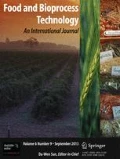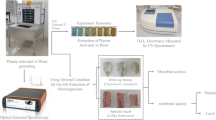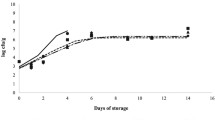Abstract
Coconut water is widely consumed and appreciated due its sensory, nutritional, and functional characteristics. Despite being widely consumed, this beverage has a short shelf life that can be improved through processing technologies including non-thermal technologies. Although this processing is promising, it also can generate toxic bioactive compounds of natural and synthetic origin. Their safety has been long discussed, and concern for human food security is now clearly manifested by warnings added on products labels. The aim of this work was to evaluate the toxic and the protective effect of natural and processed coconut water by non-thermal technologies against oxidative stress in brine shrimp (Artemia salina). For acute toxicity test, A. salina nauplii instar II were exposed to different concentrations and ozone-processed (OTCW), plasma-processed (PTCW), and ultrasound-processed (UTCW) coconut water. The non-processed sample was the negative control. By the end of experiment (48 h), dead nauplii were counted and investigated under optical and electron microscopy. The protective effect was evaluated against H2O2 and morphological changes were also investigated. Coconut water treated with plasma and ultrasound was not toxic to Artemia salina nauplii at 10, 100, or 1000 μg mL−1; however, ozone-treated artificial seawater caused a mild toxicity to nauplii exposed to 1000 μg mL−1. All coconut water samples, included untreated samples, presented protective effect against oxidative stress caused by H2O2 reaching levels of 87.5% protection compared to control (24 h of experiment).









Similar content being viewed by others
References
Ahsan, H., Ali, A., & Ali, R. (2003). Oxygen free radicals and antioxidants. The American Journal of Nursing, 131(4), 389–404. https://doi.org/10.1097/00000446-200304000-00022.
Alves Filho, E. G., Sousa, V. M., Rodrigues, S., de Brito, E. S., & Fernandes, F. A. N. (2020). Green ultrasound-assisted extraction of chlorogenic acids from sweet potato peels and sonochemical hydrolysis of caffeoylquinic acids derivatives. Ultrasonics Sonochemistry, 63(April 2019), 104911. https://doi.org/10.1016/j.ultsonch.2019.104911.
Amado, D. A. V., Helmann, G. A. B., Detoni, A. M., de Carvalho, S. L. C., de Aguiar, C. M., Martin, C. A., et al. (2019). Antioxidant and antibacterial activity and preliminary toxicity analysis of four varieties of avocado (Persea americana Mill.). Brazilian Journal of Food Technology, 22, 1–11. https://doi.org/10.1590/1981-6723.04418.
An, H. J., Sarkheil, M., Park, H. S., Yu, I. J., & Johari, S. A. (2019). Comparative toxicity of silver nanoparticles (AgNPs) and silver nanowires (AgNWs) on saltwater microcrustacean, Artemia salina. Comparative Biochemistry and Physiology Part - C: Toxicology and Pharmacology, 218(January), 62–69. https://doi.org/10.1016/j.cbpc.2019.01.002.
Apu, A., Hossan Bhuyan, S., Khatun, F., Sultana Liza, M., Matin, M., & Faruq Hossain, M. (2013). Assessment of cytotoxic activity of two medicinal plants using brine shrimp (Artemia salina) as an experimental tool. International Journal of Pharmaceutical Sciences and Research, 4(3), 1125–1130 www.ijpsr.com.
Arulvasu, C., Jennifer, S. M., Prabhu, D., & Chandhirasekar, D. (2014). Toxicity effect of silver nanoparticles in brine shrimp artemia. The Scientific World Journal, 2014, 1–10. https://doi.org/10.1155/2014/256919.
AshaRani, P. V., Mun, G. L. K., Hande, M. P., & Valiyaveettil, S. (2009). Cytotoxicity and genotoxicity of silver nanomaterials. Technical Proceedings of the 2009 NSTI Nanotechnology Conference and Expo, NSTI-Nanotech 2009, 2(2), 383–386.
Ates, M., Danabas, D., Ertit, B., Ilkay, T., Isil, U., Cicek, C., & Onder, C. (2020). Assessment of oxidative stress on Artemia salina and Daphnia magna after exposure to Zn and ZnO nanoparticles. Bulletin of Environmental Contamination and Toxicology, 104(2), 206–214. https://doi.org/10.1007/s00128-019-02751-6.
Augusto, P. E. D., Ibarz, R., Garvín, A., & Ibarz, A. (2015). Peroxidase (POD) and polyphenol oxidase (PPO) photo-inactivation in a coconut water model solution using ultraviolet (UV). Food Research International, 74, 151–159. https://doi.org/10.1016/j.foodres.2015.04.046.
Batel, A., Baumann, L., Carteny, C. C., Cormier, B., Keiter, S. H., & Braunbeck, T. (2020). Histological, enzymatic and chemical analyses of the potential effects of differently sized microplastic particles upon long-term ingestion in zebrafish (Danio rerio). Marine Pollution Bulletin, 153(January), 111022. https://doi.org/10.1016/j.marpolbul.2020.111022.
Bevilacqua, A., Petruzzi, L., Perricone, M., Speranza, B., Campaniello, D., Sinigaglia, M., & Corbo, M. R. (2018). Nonthermal technologies for fruit and vegetable juices and beverages: Overview and advances. Comprehensive Reviews in Food Science and Food Safety, 17(1), 2–62. https://doi.org/10.1111/1541-4337.12299.
Bianchi, M. L. P., & Antunes, L. M. G. (1999). Release of mercury from human tissues stored in formalin solution. Revista de Nutrição, 12(2), 123–130. https://doi.org/10.1248/jhs1956.35.P28.
Charoux, C. M. G., Free, L., Hinds, L. M., Vijayaraghavan, R. K., Daniels, S., O’Donnell, C. P., & Tiwari, B. K. (2020). Effect of non-thermal plasma technology on microbial inactivation and total phenolic content of a model liquid food system and black pepper grains. Lwt, 118(October 2019), 108716. https://doi.org/10.1016/j.lwt.2019.108716.
Chen, D., Chen, P., Cheng, Y., Peng, P., Liu, J., Ma, Y., Liu, Y., & Ruan, R. (2019). Deoxynivalenol decontamination in raw and germinating barley treated by plasma-activated water and intense pulsed light. Food and Bioprocess Technology, 12(2), 246–254. https://doi.org/10.1007/s11947-018-2206-2.
Choi, J. S. (2017). Larvicidal effects of grapefruit seed extract (GSE) on brine shrimp Artemia salina. Toxicology and Environmental Health Sciences, 9(3), 209–214. https://doi.org/10.1007/s13530-017-0322-4.
Clément, L., Hurel, C., & Marmier, N. (2013). Toxicity of TiO2 nanoparticles to cladocerans, algae, rotifers and plants - effects of size and crystalline structure. Chemosphere, 90(3), 1083–1090. https://doi.org/10.1016/j.chemosphere.2012.09.013.
Cruzeiro, C., Amaral, S., Rocha, E., & Rocha, M. J. (2017). Determination of 54 pesticides in waters of the Iberian Douro River estuary and risk assessment of environmentally relevant mixtures using theoretical approaches and Artemia salina and Daphnia magna bioassays. Ecotoxicology and Environmental Safety, 145(June), 126–134. https://doi.org/10.1016/j.ecoenv.2017.07.010.
da Rosa, A. P. P., Cavalcante, R. P., da Silva, D. A., da Silva, L. d. M., da Silva, T. F., Gozzi, F., et al. (2019). H2O2-assisted photoelectrocatalytic degradation of Mitoxantrone using CuO nanostructured films: Identification of by-products and toxicity. Science of the Total Environment, 651, 2845–2856. https://doi.org/10.1016/j.scitotenv.2018.10.173.
Del Ré, P. V., & Jorge, N. (2012). Especiarias como antioxidantes naturais: Aplicações em alimentos e implicação na saúde. Revista Brasileira de Plantas Medicinais, 14(2), 389–399. https://doi.org/10.1590/S1516-05722012000200021.
Dourado, C., Pinto, C., Barba, F. J., Lorenzo, J. M., Delgadillo, I., & Saraiva, J. A. (2019). Innovative non-thermal technologies affecting potato tuber and fried potato quality. Trends in Food Science and Technology, 88(February), 274–289. https://doi.org/10.1016/j.tifs.2019.03.015.
Fotsis, T., Pepper, M. S., Aktas, E., Breit, S., Rasku, S., Adlercreutz, H., Wähälä, K., Montesano, R., & Schweigerer, L. (1997). Flavonoids, dietary-derived inhibitors of cell proliferation and in vitro angiogenesis. Cancer Research, 57(14), 2916–2921.
Garaventa, F., Gambardella, C., Di Fino, A., Pittore, M., & Faimali, M. (2010). Swimming speed alteration of Artemia sp. and Brachionus plicatilis as a sub-lethal behavioural end-point for ecotoxicological surveys. Ecotoxicology, 19(3), 512–519. https://doi.org/10.1007/s10646-010-0461-8.
Gerbino, E., Ghibaudo, F., Tymczyszyn, E. E., Gomez-Zavaglia, A., & Hugo, A. A. (2020). Probiotics, galacto-oligosaccharides, and zinc antagonize biological effects of enterohaemorrhagic Escherichia coli on cultured cells and brine shrimp model. Lwt, 128(April), 109435. https://doi.org/10.1016/j.lwt.2020.109435.
Gottschalk, F., Sun, T., & Nowack, B. (2013). Environmental concentrations of engineered nanomaterials: Review of modeling and analytical studies. Environmental Pollution. Elsevier Ltd., 181, 287–300. https://doi.org/10.1016/j.envpol.2013.06.003.
Guillén, S., Marcén, M., Mañas, P., & Cebrián, G. (2020). Differences in resistance to different environmental stresses and non-thermal food preservation technologies among Salmonella enterica subsp. enterica strains. Food Research International, 132(October 2019), 109042. https://doi.org/10.1016/j.foodres.2020.109042.
Halliwell, B., & Gutteridget, J. M. C. (1984). Oxygen toxicity,oxygen radicals, transition metals and disease. The Biochemical Journal, 219(1), 1–14.
Hamza, F., Kumar, A. R., & Zinjarde, S. (2018a). Coculture induced improved production of biosurfactant by Staphylococcus lentus SZ2: Role in protecting Artemia salina against Vibrio harveyi. Enzyme and Microbial Technology, 114(March), 33–39. https://doi.org/10.1016/j.enzmictec.2018.03.008.
Hamza, F., Kumar, A. R., & Zinjarde, S. (2018b). Efficacy of cell free supernatant from Bacillus licheniformis in protecting Artemia salina against Vibrio alginolyticus and Pseudomonas gessardii. Microbial Pathogenesis, 116(February), 335–344. https://doi.org/10.1016/j.micpath.2018.02.003.
Hernández-Hernández, H. M., Moreno-Vilet, L., & Villanueva-Rodríguez, S. J. (2019). Current status of emerging food processing technologies in Latin America: Novel non-thermal processing. Innovative Food Science and Emerging Technologies, 58(October), 102233. https://doi.org/10.1016/j.ifset.2019.102233.
Jiang, B. P., Zhou, B., Lin, Z., Liang, H., & Shen, X. C. (2019). Recent advances in carbon nanomaterials for cancer phototherapy. Chemistry - A European Journal, 25(16), 3993–4004. https://doi.org/10.1002/chem.201804383.
Johari, S. A., Rasmussen, K., Gulumian, M., Ghazi-Khansari, M., Tetarazako, N., Kashiwada, S., Asghari, S., Park, J. W., & Yu, I. J. (2019). Introducing a new standardized nanomaterial environmental toxicity screening testing procedure, ISO/TS 20787: aquatic toxicity assessment of manufactured nanomaterials in saltwater Lakes using Artemia sp. nauplii. Toxicology Mechanisms and Methods, 29(2), 95–109. https://doi.org/10.1080/15376516.2018.1512695.
Khoshnood, R., Jaafarzadeh, N., Jamili, S., Farshchi, P., & Taghavi, L. (2017). Acute toxicity of TiO2, CuO and ZnO nanoparticles in brine shrimp, Artemia franciscana. Iranian Journal of Fisheries Sciences, 16(4), 1287–1296.
Les, F., Prieto, J. M., Arbonés-Mainar, J. M., Valero, M. S., & López, V. (2015). Bioactive properties of commercialised pomegranate (Punica granatum) juice: Antioxidant, antiproliferative and enzyme inhibiting activities. Food & Function, 6(6), 2049–2057. https://doi.org/10.1039/c5fo00426h.
Levaens, P., & Sorgeloos, P. (1996). Manual on the production and use of live food for aquaculture. FAO Fisheries Technical Paper, 305.
Li, F., Chen, G., Zhang, B., & Fu, X. (2017). Current applications and new opportunities for the thermal and non-thermal processing technologies to generate berry product or extracts with high nutraceutical contents. Food Research International, 100(August), 19–30. https://doi.org/10.1016/j.foodres.2017.08.035.
Lindsay, J., Metcalf, J. S., & Codd, G. A. (2006). Protection against the toxicity of microcystin-LR and cylindrospermopsin in Artemia salina and Daphnia spp. by pre-treatment with cyanobacterial lipopolysaccharide (LPS). Toxicon, 48(8), 995–1001. https://doi.org/10.1016/j.toxicon.2006.07.036.
Liu, Z., Esveld, E., Vincken, J. P., & Bruins, M. E. (2019). Pulsed electric field as an alternative pre-treatment for drying to enhance polyphenol extraction from fresh tea leaves. Food and Bioprocess Technology, 12(1), 183–192. https://doi.org/10.1007/s11947-018-2199-x.
Madhav, M. R., David, S. E. M., Kumar, R. S. S., Swathy, J. S., Bhuvaneshwari, M., Mukherjee, A., & Chandrasekaran, N. (2017). Toxicity and accumulation of copper oxide (CuO) nanoparticles in different life stages of Artemia salina. Environmental Toxicology and Pharmacology, 52(March), 227–238. https://doi.org/10.1016/j.etap.2017.03.013.
Manfra, L., Tornambè, A., Savorelli, F., Rotini, A., Canepa, S., Mannozzi, M., & Cicero, A. M. (2014). Ecotoxicity of diethylene glycol and risk assessment for marine environment. Journal of Hazardous Materials, 284, 130–135. https://doi.org/10.1016/j.jhazmat.2014.11.008.
Melchior, S., Calligaris, S., Bisson, G., & Manzocco, L. (2020). Understanding the impact of moderate-intensity pulsed electric fields (MIPEF) on structural and functional characteristics of pea, rice and gluten concentrates. Food and Bioprocess Technology, 13(12), 2145–2155. https://doi.org/10.1007/s11947-020-02554-2.
Meyer, B. N., Ferrigni, N. R., & Putnam, J. E. (1982a). Brine shrimp: A convenient general bioassay for active plant constituents. Planta Medica, 45(1), 31–34. https://doi.org/10.1055/s-2007-971236.
Meyer, B. N., Ferrigni, N. R., Putnam, J. E., Jacobsen, L. B., McLaughlin, J. L., & Nichols, D. E. (1982b). Brine shrimp a convenient general bioassay for active plants constituents. Journal of Medicinal Plant Research, 45(5), 31–34. https://doi.org/10.1055/s-2007-971236.
Mieszczakowska-Frąc, M., Dyki, B., & Konopacka, D. (2016). Effects of ultrasound on polyphenol retention in apples after the application of predrying treatments in liquid medium. Food and Bioprocess Technology, 9(3), 543–552. https://doi.org/10.1007/s11947-015-1648-z.
Moreira, S. A., Alexandre, E. M. C., Pintado, M., & Saraiva, J. A. (2019). Effect of emergent non-thermal extraction technologies on bioactive individual compounds profile from different plant materials. Food Research International, 115(May 2018), 177–190. https://doi.org/10.1016/j.foodres.2018.08.046.
Morgana, S., Estévez-Calvar, N., Gambardella, C., Faimali, M., & Garaventa, F. (2018). A short-term swimming speed alteration test with nauplii of Artemia franciscana. Ecotoxicology and Environmental Safety, 147(September 2017), 558–564. https://doi.org/10.1016/j.ecoenv.2017.09.026.
Motta, C. M., Simoniello, P., Arena, C., Capriello, T., Panzuto, R., Vitale, E., Agnisola, C., Tizzano, M., Avallone, B., & Ferrandino, I. (2019). Effects of four food dyes on development of three model species, Cucumis sativus, Artemia salina and Danio rerio: Assessment of potential risk for the environment. Environmental Pollution, 253(1333), 1126–1135. https://doi.org/10.1016/j.envpol.2019.06.018.
Muthukrishnan, S., Kumar, T. S., & Rao, M. V. (2017). Activity of biogenic nanosilver and its toxicity assessment on Artemia salina - evaluation of mortality , accumulation and elimination: An experimental report. Journal of Environmental Chemical Engineering, 5(2), 1685–1695. https://doi.org/10.1016/j.jece.2017.03.004.
Nunes, B. S., Carvalho, F. D., Guilhermino, L. M., & Van Stappen, G. (2006). Use of the genus Artemia in ecotoxicity testing. Environmental Pollution, 144(2), 453–462. https://doi.org/10.1016/j.envpol.2005.12.037.
Ocaranza-Joya, V. S., Manjarrez-Alcivar, I., Ruizgonzález, L. E., Guerrero-Galván, S. R., & Vega-Villasante, F. (2019). Sensitivity of different stages of Artemia franciscana to potassium dichromate. Pan-American Journal of Aquatic Sciences, 14(1), 8–12.
Ozkan, Y., Altinok, I., Ilhan, H., & Sokmen, M. (2016). Determination of TiO 2 and AgTiO 2 nanoparticles in Artemia salina: Toxicity, morphological changes , uptake and depuration. Bulletin of Environmental Contamination and Toxicology, 96(1), 36–42. https://doi.org/10.1007/s00128-015-1634-1.
Paixão, L. M. N., Fonteles, T. V., Oliveira, V. S., Fernandes, F. A. N., & Rodrigues, S. (2019). Cold plasma effects on functional compounds of siriguela juice. Food and Bioprocess Technology, 12(1), 110–121. https://doi.org/10.1007/s11947-018-2197-z.
Pérez-Andrés, J. M., Charoux, C. M. G., Cullen, P. J., & Tiwari, B. K. (2018). Chemical modifications of lipids and proteins by nonthermal food processing technologies. Journal of Agricultural and Food Chemistry, 66(20), 5041–5054. https://doi.org/10.1021/acs.jafc.7b06055.
Piechowiak, T., Skóra, B., & Balawejder, M. (2020). Ozone treatment induces changes in antioxidative defense system in blueberry fruit during storage. Food and Bioprocess Technology, 13(7), 1240–1245. https://doi.org/10.1007/s11947-020-02450-9.
Pool-Zobel, B. L., Bub, A., Müller, H., Wollowski, I., & Rechkemmer, G. (1997). Consumption of vegetables reduces genetic damage in humans: First results of a human intervention trial with carotenoid-rich foods. Carcinogenesis, 18(9), 1847–1850. https://doi.org/10.1093/carcin/18.9.1847.
Porto, E., Alves Filho, E. G., Silva, L. M. A., Fonteles, T. V., do Nascimento, R. B. R., Fernandes, F. A. N., et al. (2020). Ozone and plasma processing effect on green coconut water. Food Research International, 131(January), 109000. https://doi.org/10.1016/j.foodres.2020.109000.
Rocha-Filho, C. A. A., Albuquerque, L. P., Silva, L. R. S., Silva, P. C. B., Coelho, L. C. B. B., Navarro, D. M. A. F., Albuquerque, M. C. P. A., Melo, A. M. M. A., Napoleão, T. H., Pontual, E. V., & Paiva, P. M. G. (2015). Assessment of toxicity of Moringa oleifera flower extract to Biomphalaria glabrata, Schistosoma mansoni and Artemia salina. Chemosphere, 132, 188–192. https://doi.org/10.1016/j.chemosphere.2015.03.041.
Sarkheil, M., Johari, S. A., An, H. J., Asghari, S., Park, H. S., Sohn, E. K., & Yu, I. J. (2018). Acute toxicity, uptake, and elimination of zinc oxide nanoparticles (ZnO NPs) using saltwater microcrustacean, Artemia franciscana. Environmental Toxicology and Pharmacology, 57(October 2017), 181–188. https://doi.org/10.1016/j.etap.2017.12.018.
Shaala, N. M., Zulkifli, S. Z., Ismail, A., Azmai, M. N. A., & Mohamat-Yusuff, F. (2015). Selected morphological changes in nauplii of brine shrimp (Artemia salina) after tributyltin chloride (TBTCL) exposure. World Applied Sciences Journal, 33(8), 1334–1340. https://doi.org/10.5829/idosi.wasj.2015.33.08.15230.
Sharma, P., Jha, A. B., Dubey, R. S., & Pessarakli, M. (2012). Reactive oxygen species, oxidative damage, and antioxidative defense mechanism in plants under stressful conditions. Journal of Botany, 2012, 1–26. https://doi.org/10.1155/2012/217037.
Sirdaarta, J., & Cock, I. E. (2010). Effect of Aloe barbadensis Miller juice on oxidative stress biomarkers in aerobic cells using Artemia franciscana as a model. Phytotherapy Research, 24(3), 360–364. https://doi.org/10.1002/ptr.2946.
Sucupira, N. R., Alves Filho, E. G., Silva, L. M. A., de Brito, E. S., Wurlitzer, N. J., & Sousa, P. H. M. (2017). NMR spectroscopy and chemometrics to evaluate different processing of coconut water. Food Chemistry, 216, 217–224. https://doi.org/10.1016/j.foodchem.2016.08.035.
Victoria Barahona, M., & Sánchez-Fortún, S. (2007). Protective effect induced by atropine, carbamates, and 2-pyridine aldoxime methoiodide Artemia salina larvae exposed to fonofos and phosphamidon. Ecotoxicology and Environmental Safety, 66(1), 65–73. https://doi.org/10.1016/j.ecoenv.2005.10.003.
Vollmer, K., Santarelli, S., Vásquez-Caicedo, A. L., Iglesias, S. V., Frank, J., Carle, R., & Steingass, C. B. (2020). Non-thermal processing of pineapple (Ananas comosus [L.] Merr.) juice using continuous pressure change technology (PCT): Effects on physical traits, microbial loads, enzyme activities, and phytochemical composition. Food and Bioprocess Technology, 13(10), 1833–1847. https://doi.org/10.1007/s11947-020-02520-y.
Yi, X., Zhang, K., Liu, R., Giesy, J. P., Li, Z., Li, W., Zhan, J., Liu, L., & Gong, Y. (2020). Transcriptomic responses of Artemia salina exposed to an environmentally relevant dose of Alexandrium minutum cells or gonyautoxin2/3. Chemosphere, 238, 124661. https://doi.org/10.1016/j.chemosphere.2019.124661.
Zhang, Z. H., Wang, L. H., Zeng, X. A., Han, Z., & Brennan, C. S. (2019). Non-thermal technologies and its current and future application in the food industry: A review. International Journal of Food Science and Technology, 54(1), 1–13. https://doi.org/10.1111/ijfs.13903.
Zulaikhah, S. T. (2019). Health benefits of tender coconut water (TCW). International Journal of Pharmaceutical Sciences and Research, 10(2), 474–480. https://doi.org/10.13040/IJPSR.0975-8232.10(2).474-80.
Funding
TBARM acknowledge funding from CNPq (grant 350023/2020-4) and Central Analítica-UFC/CT-INFRA-FINEP/Pro-Equipamentos-CAPES/CNPq-SisNano-MCTI 2019 (Grant 442577/2019-2). Capes, INCT and FUNCAP.
Author information
Authors and Affiliations
Corresponding author
Ethics declarations
Conflict of interest
The authors declare that they have no conflict of interest.
Additional information
Publisher’s Note
Springer Nature remains neutral with regard to jurisdictional claims in published maps and institutional affiliations.
Supplementary Information
ESM 1
(DOCX 47 kb)
Rights and permissions
About this article
Cite this article
Miguel, T.B.A.R., Porto, E.C.M., de Paiva Pinheiro, S.K. et al. Protective Effect of Natural and Processed Coconut Water by Non-thermal Technologies Against Oxidative Stress in Brine Shrimp (Artemia salina). Food Bioprocess Technol 14, 702–716 (2021). https://doi.org/10.1007/s11947-021-02600-7
Received:
Accepted:
Published:
Issue Date:
DOI: https://doi.org/10.1007/s11947-021-02600-7




